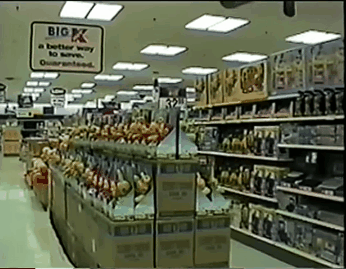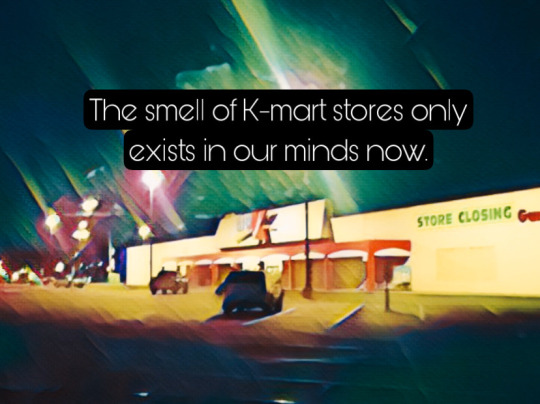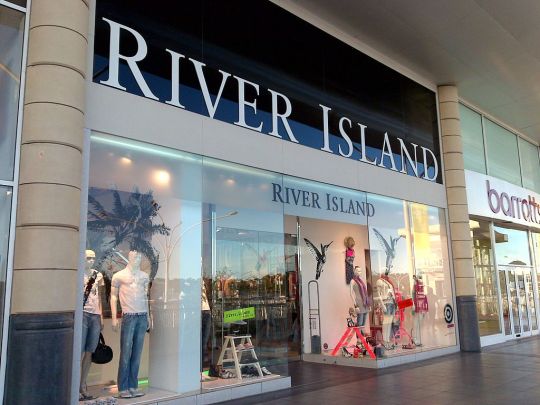#kmart corporation
Text
K-Mart Grand Opening





405 notes
·
View notes
Text

#dreamcore#weirdcore#aesthetic#surreal aesthetic#y2k aesthetic#liminal spaces#kmart corporation#kmart#nostalgia#vaporwave#vaporwave aesthetic
17 notes
·
View notes
Link
Hey guys i found out Kmart is back as a online store only.
0 notes
Text
Gonna listen to 1980s kmart radio all day
#the attention kmart shoppers collection of tapes on archive.org isnt appreciated enough#yeah its dumb corporate radio but its the pinnacle of MUSAK#its got that perfect middle ground feeling where its just offputting enough#its abandoned mall music
10 notes
·
View notes
Text
i miss kmart
1 note
·
View note
Text





Having a grand old time at Sears Grand, Pittsburgh Mills.
Sears Grand was a concept launched in 2003 by Alan Lacy, the not-so-successful CEO and Chairman of Sears USA at the time. Sears Grand stores were generally larger than a regular Sears department store, more often located at strip centers rather than malls, and carried an expanded array of merchandise, including full grocery section, to compete with Target and Walmart Supercenters. But according to Mark Cohen, the CEO and Chairman of Sears Canada at the time, the prototype stores for Sears Grand did not do well. While that's not unusual for new prototype stores, Cohen says his visit to one of the stores showed him that the presentation failed to emphasize the thing that Sears had over its competitors: desirable brand names like Craftsman, Kenmore, and DieHard. In addition, the grocery section was a money pit, as few people were buying the food and it ended up just getting thrown out.
Nevertheless, Alan Lacy pushed the Sears Grand concept further. He bought 51 stores from Kmart, which had just survived its first bankruptcy, for $605 million, with the intention of converting them to Sears Grand. That was a dramatic overpayment for some of the crappiest Kmart stores you could find. In 2005, Kmart Corporation, under the infamous rule of Eddie Lampert, bought out the entirety of Sears. From this point on, the Sears Grand concept was basically abandoned, and a handful of stores kept the glorified "Grand" moniker for seemingly no reason. The last Sears Grand in Thornton, Colorado, closed in March 2021.
#sears grand#sears#pittsburgh mills#photography#retail#dead mall#dead malls#deadmall#mall#malls#shopping mall#shopping malls#retail apocalypse#history#dead mall series#exploration#explore#pittsburgh
32 notes
·
View notes
Text
hellOOOOOOOOOOOOOOOOOOOOOOOOOOOO tomato suop tasters
we are BACK
with ANOTHER
SCREEN
SHOT
SATURDAY!!!!!!!!!!!!!!!!!!!!!!!!!!!!!!!!!!!!!!
and BOY do i have a lot for you this week! speaking of...
REJOICE
MUSIC
LEND THINE EARS
(reminder. i. i am plaguetech. i made these. ME.)
ok so as you can see, these two are VERY unfinished. Counter Care's mixing is all funky and Corporate Serenade just kinda cuts out. but i thought i would post what i have here because that's just how i roll lol
you may be wondering, where are these meant to play? these don't seem very y2k.....
i want these to play in some kind of shopping center-like environment. like a place where you can buy items or smth
i based these songs off of the kmart muzak tapes that were released. if you're curious, look up "Attention Kmart Shoppers"
also kmart still existed in 2004 so HAH FUCK YOUUUUUUUUUUUUUUUUUUUUUUU >:]
(just kiddin ily all)
fun fact: i was able to get all this music work done for one reason and one reason only: i bought a shitty pair of headphones off ebay
yep.
for clarification, i'm neurodivergent as FUCK. i cannot work without a video or music on in the background.
but how can i listen to music WHILE making music!!!! quite the conundrum!!!!!
a conundrum that i SOLVED
HAH
Step 1: Put in Airpods.
Step 2: Put Shitty Headphones on your ears (over the airpods.)
Step 3: thas it broooooooooooo
now i can listen to music AND make music AT THE SAME TIME! DOUBLE THE POWER FOR ONLY HALF THE PRICE
alright that's gonna be it for tonight. i'm tired as FUCK vro
although admittedly there isn't a lot here, i still think this is a great update. even i think these tracks are kinda fire
ily all!
-Callie
2 notes
·
View notes
Text
i think it would be funny if there was a modern world soulslike game where the main bosses are the personified 'souls' of megacorps as monstrous beings that are both revered and despised. after you literally destroy the soul of amazon, the entire corporation crumbles. your character is known as both a hated godslayer and a heroic liberator. in-between bosses you could scroll on in-universe tumblr and see posts like "PSA: The Chosen has destroyed The Eternal Kmart. If you placed a grocery order it will not be fulfilled."
147 notes
·
View notes
Text
Is it ok to buy Aboriginal art from corporations (i.e. Lowes, Kmart) if they commission and credit Aboriginal artists or should I only support small businesses directly? /g
#tbh this feels like a stupid question but Idk#for context I am Indigenous but so far I have yet to connect to culture or even meet other local Aboriginal people#because. foster care#I really want to though#aboriginal#aboriginal art#indigenous australian
28 notes
·
View notes
Text
Influencers like that Kmart tracksuit lady are openly supporting and endorsing the corporations who are trying to rid the world of colour and that makes me so sad
2 notes
·
View notes
Text
Characteristics of Toxic Office Women
The girls who think being a receptionist makes them upper class, the heads of HR who think they rule the world, and everyone in between.
Either goes overboard with her fashion or dresses like a future Karen
There is no in between. On the one hand is the girl who thinks the office is her own personal runway. Probably has one favored aesthetic that she sticks to, which can seem very costume-y at times: like vintage bitch or old money. Or the less common type gets straight to the point by dressing as sexy as she can get away with to manipulate men and intimidate women.


Then on the other hand are the women dressing old while still young, but they don't seem to realize it. They probably buy their clothes for the office at Maurices, Walmart, Kmart, or Ralph Lauren. Most outfits are comprised of unflattering billowy tops in floral print or blah colors, cropped pants like old ladies wear, and flats that only accentuate their stubby legs and make it look like they have duck feet. (Can we make that a new term? "Office Ducks") They think ankle "booties" are SUCH a power move.


EXTREMELY POWER HUNGRY!
Will claw her way to the top of the office ladder, preferrably in a position like HR, marketing, or accounting, then squeeze every last drop of sadistic pleasure out of her authority. Usually makes coworkers miserable in the process. Has bullied at least one woman out of the office (either covertly or openly), yet men in the office will still be shocked then doubtful when women come forward with stories of how awful she is. Relishes every opportunity to correct others, exact punishment, appear more knowledgeable, show off, etc. She has no power in her personal life, so she pursues it at work to make herself feel better.
A legend in her own mind
Thinks her job is SO upper echelon, but all she actually does is answer phones, push around trivial papers that accomplish nothing, and gossip by the copy machine. Genuinely thinks she's a high power business woman of Wall Street or making a positive difference in the world, but she's just another cog in the machine.
Those in a marketing department post way too much and overshare on their personal social media, thinking they are demonstrating their marketing talent by doing so. No ma'am, you're not a high profile influencer or popular blogger; you are just a loud mouth with an Internet connection and narcissism issue. The promotions you design are lackluster at best.
Hypocritical, mediocre, and lacking all self awareness
Likes to make derogatory jokes about how hard work is, how ready she is for "Friyay", and how terrible her boss is (only if she is not the boss, herself). But will turn around and act like her job makes her a class above others, the mere peasants.
Mediocre life goals. Work her way up the office food chain to the end goal of something like HR, have an average-looking husband, drive an ugly SUV, live in a cookie cutter house, and have no more than 3 children, all with the most basic names. Once she achieves this, she thinks she's queen of the world and all must bow low before her. She sits in her little office with her "inspirational" Instagram font wall art and spends all day savoring the little kingdom she has carved out for herself.
Genuinely believes she is a "wine connoisseur" and that she's classy for it. LOVES wine, wine humor, and cheesy wine accessories. Not so subtly drinks wine on work video calls. Drinks heavily over her weekends and it definitely shows on Mondays.

Climbing the corporate ladder
The younger toxics might be promiscuous cheaters. They know full well that their womanly qualities can get them moved up the office food chain. Oh, their poor boyfriends/husbands and the wives of the male coworkers they toy with!
GOSSIP is the top weapon in her arsenal for dealing with "competition" and other girls she is threatened by---other girls who have no ill will toward her and aren't actually trying to compete with her. She takes catty and passive aggressive to a whole new level.
Not all toxic women will exhibit all of these traits at the same time. But even having one of these characteristics can be enough to make everyone else in the office miserable. Be on the lookout!
4 notes
·
View notes
Text
Exploring ASX Consumer Cyclical Sector on Wesfarmers Ltd (ASX: WES)
The ASX Consumer Cyclical sector, a dynamic landscape shaped by consumer spending patterns, economic trends, and market sentiments, presents investors with intriguing opportunities. Amidst this sector's diverse offerings, one company that stands out is Wesfarmers Ltd (ASX: WES), a conglomerate with a rich history and a prominent position in the Australian market.
Understanding Consumer Cyclical
The Consumer Cyclical sector encompasses industries heavily influenced by economic cycles and consumer discretionary spending. It includes companies involved in retail, automotive, travel, and leisure. This sector is known for its sensitivity to economic conditions, as consumer spending tends to fluctuate with economic health and consumer confidence.
Wesfarmers Ltd: A Pillar in Consumer Cyclical
Wesfarmers, a major player in the Australian corporate landscape with a $72 billion market capitalization, strategically positions itself in the diverse Consumer Cyclical sector. Boasting influential brands like Bunnings, Kmart, Officeworks, and Priceline, Wesfarmers maintains resilience across economic conditions with its diversified portfolio. Despite sector volatility, Wesfarmers provides stability for income-focused investors through consistent dividend growth, showcasing its commitment to satisfactory returns. The company's strategic approach involves effective management of existing businesses and exploration of growth opportunities, including expansion into the healthcare industry, reflecting a forward-thinking mindset dedicated to long-term shareholder wealth.
Investing in Consumer Cyclical
Investors eyeing the Consumer Cyclical sector, including leaders like Wesfarmers, should consider economic indicators, such as consumer confidence and employment rates. Staying attuned to market trends and innovations is crucial in this dynamic sector, where companies adapting to changing consumer preferences thrive. Given the inherent volatility, prudent risk management, and diversification are key to navigating potential market fluctuations.
Conclusion
As investors explore opportunities in the ASX Consumer Cyclical sector, Wesfarmers Ltd emerges as a compelling choice. With its diverse business portfolio, commitment to dividends, and strategic growth initiatives, Wesfarmers stands as a robust player in this dynamic sector. However, as with any investment, thorough research and a keen understanding of market dynamics are essential for informed decision-making.
In a landscape where consumer behavior shapes market trends, Wesfarmers' enduring presence and strategic approach position it as a beacon for those seeking stability and growth in the Consumer Cyclical sector.
0 notes
Text
Australia Day: It's all the LGBT fault now
New Post has been published on https://qnews.com.au/australia-day-its-all-the-lgbt-fault-now/
Australia Day: It's all the LGBT fault now

Blame quickly attaches to the LGBT community in the American-inspired culture wars seeping into Australian daily life. So quelle surprise that someone has found a way to credit us for the annual War on Australia Day crap.
BTW, lots of people would happily take credit. But no one banned anything. The soulless corporations that run the bulk of our supermarkets only GAF about one thing — profit. No moral imperative compelled any of them to stop stocking thongs bedecked with Australian flags. Peter Dutton and that antiquated radio performance artist on The Project can bang on all they like about boycotts and bans. It’s bullshit, and they know it.
Let’s meet Lisa
Anyway, introducing Lisa. Lisa has worked out that every retailer who ‘banned’ Australia Day merchandise, nevertheless sells Pride merch. And she manages to sneak in a crafty ‘think of the kiddies’ reference.
Hey Lisa, did you ever consider that maybe the Pride stuff sells?
Every single retailer that has banned the sale of Australia Day merch sells Pride merch. Every single one of them. Interestingly too, lots of it is directed at kids
Aldi – they stocked the children’s book ‘a boy in a dress’
Kmart – they have a full range of children’s family… pic.twitter.com/xZ9m3AHcFb
— Lisa (@Lisa9Sophia) January 13, 2024
Then, meet Leanne…
Leanne is all over X, telling everyone about her hubby working at a Woolies pub. He allegedly attended a staff meeting yesterday and was told not to wear Australia Day apparel on January 26.
Some people didn’t believe Leanne and disputed her assertion. But she became more insistent as the day wore on. By the end of the day, her husband managed the pub, and her son worked there too.
But just one big problem.
Woolies sold out of pubs in 2021. The supermarket giant retains a small, non-controlling interest and cannot instruct staff on anything.
It’s a big porky, but don’t upset Leanne. At the rate she’s going, the entire family down to third cousins four times removed will soon rely on jobs at the non-existent pub.
Among other things, Woolworths own exactly zero pubs https://t.co/5dDqRZ25L2
— Nathan Wind (@Dura_Ace) January 12, 2024
For the latest LGBTIQA+ Sister Girl and Brother Boy news, entertainment, community stories in Australia, visit qnews.com.au. Check out our latest magazines or find us on Facebook, Twitter, Instagram and YouTube.
0 notes
Text
[ad_1]
Bloomberg/Bloomberg by means of Getty Photographs
Bloomberg/Bloomberg by means of Getty Photographs
Within the first scene of the primary episode of the vintage sitcom 30 Rock, tv showrunners Liz Lemon and Pete Hornberger nervously stroll into an administrative center underneath renovation to fulfill their boss, Gary. They may be able to't see him anyplace. "The place is Gary?" asks Lemon. Simply then a person in a go well with kicks down a wall and barges into the room. "Gary's lifeless," the person says. "I am Jack Donaghy, new VP of construction for NBC-GE-Common-Kmart." Donaghy explains GE has promoted him as a result of "his largest triumph": the GE Trivection oven. It combines radiant warmth, convection, and microwave era, permitting you to "prepare dinner a turkey in 22 mins." His function in growing the oven is "why they despatched me right here to retool your display," Donaghy explains. "I am the brand new vp of East Coast tv and microwave oven programming." 30 Rock completely encapsulated the absurdity of conglomerates, behemoth firms working in a mishmash of unrelated industries. In spite of downsizing within the years since 30 Rock first aired (2006), GE remained the quintessential conglomerate. This is, till previous this month, when GE introduced it was once splitting into three separate firms, independently inquisitive about aviation, healthcare, and effort. Personal fairness corporations are expected to additional select away on the death conglomerate's carcass.
It's possible you'll name this the top of the conglomerate age. However, in actual fact, that age ended a long time in the past in america. GE is only one of a couple of lumbering dinosaurs that survived the asteroid crash. However whilst the previous American conglomerates are going extinct, a brand new breed is evolving to take their position on the best of the meals chain: Techglomerates. Firms like Google, Fb, and Amazon had been obtaining firms and coming into into industries they have got historically had no involvement in. Traders deal with old-school conglomerates like they are radioactive, however they are treating Techglomerates like they are Pete Davidson (who it seems that everyone needs to carry at the present time). Name it the Conglomerate Paradox. However are Techglomerates actually other? Or will the similar forces result in their loss of life? When Conglomerates Had been Groovy Again within the overdue Nineteen Sixties, conglomerates had been all of the rage. Take the ITT Company, which, via a frenzy of acquisitions, managed firms like Sheraton Accommodations, Avis automotive leases, Hartford Insurance coverage, and the maker of Marvel Bread. Or the LTV Company, which oversaw firms in aviation, shopper electronics, missile production, wearing items, and meat packing. Or Litton Industries, which started as an electronics corporate and protection contractor, however wolfed up Stouffer's frozen meals, a typewriter corporate, a producer of family home equipment, and quite a lot of furnishings makers. In 1968, The Saturday Night Submit mag declared in a headline, "It Is Theoretically Imaginable for the Complete United States to Turn out to be One Huge Conglomerate."
[Editor's note: This is an excerpt of Planet Money's newsletter. You can sign up here.] Again when conglomerate mania was once at its zenith, within the mid-to-late Nineteen Sixties, Baruch Lev was once a PhD scholar on the College of Chicago. "I remember the fact that one of the most first questions within the first finance examination that I took was once: what's the trade rationale for conglomerates?" says Lev, who just lately retired after a few years as a professor at NYU's Stern Faculty of Trade. To many firms, the solution was once easy: it was once some way for them to get larger and extra winning.
The government, whilst actively hostile to many varieties of mergers and acquisitions, was once beautiful lax when it got here to firms increasing into unrelated industries. However, much more importantly, firms believed that by means of branching out into more than one strains of commercial, they may strategically fortify each and every of the ones companies and insulate themselves from the ups-and-downs of markets. If one trade had a foul yr, as an example, conglomerates may just cushion losses with earnings from different industries. "The theory was once that by means of making an investment in different industries, you diversify the money float of the corporate," Lev says. "Other folks mentioned 'inside capital markets,' permitting you to allocate cash from this corporate to that corporate." The buzzword was once "synergy," and the speculation was once that the sum of an organization may well be price greater than its person portions. With a conglomerate, the pondering went, 2 + 2 = 5. Conglomerate Turns into A Dangerous Phrase Lev by no means purchased into the conglomerate hype. "The entire thing was once a sham," he says. The core financial case for a conglomerate was once diversification, the facility of an organization to stabilize and spice up its proportion value by means of branching out into a various array of industries. However, Lev says, traders can do diversification themselves. In case you are anxious that the airline trade could have a foul yr, as an example, you'll put a few of your cash in a healthcare corporate. You don't want some CEO of an airline corporate to shop for and arrange the healthcare corporate. "There may be completely no trade justification for conglomerates, as a result of traders can succeed in — on their very own — the whole thing that the conglomerate achieves," Lev says. This was once particularly the case after the upward push of mutual, exchange-traded, and index price range, which enable traders to diversify possibility and purchase stocks of a various array of businesses very cost effectively. Additionally, traders can do that with no need to take care of all of the issues that conglomerates create. Issues that get up when a bloated company paperwork struggles to supervise an unwieldy collection of companies: deficient oversight, mismanagement, and sketchy choices, like sending the person at the back of the GE Trivection oven to run a tv display. It is why, Lev says, learn about after learn about unearths conglomerates are inevitably harm by means of one thing referred to as "the diversification discount." It refers to proof that a conglomerate's inventory value is round 10 p.c less than it will be if the conglomerate had been as an alternative damaged aside and bought at the inventory marketplace as separate firms. It seems the entire is in fact price lower than the sum of its portions. With a conglomerate, 2 + 2 = 3. Within the Nineteen Eighties, traders wised as much as all this — and there was once a massacre for conglomerates in america. Jerry Davis, a professor on the College of Michigan's Ross Faculty of Trade, printed a study about their dramatic decline. He says it was once facilitated, partly, by means of a 1982 Superb Courtroom case that made it more straightforward for monetary corporations to take over and restructure floundering companies. Through 1990, Davis says, "the everyday company was once far more lean and inquisitive about its core competence." The Upward push Of The Techglomerate Baruch Lev has been running on a guide about mergers and acquisitions, and as a part of that, he just lately analyzed 36,000 company acquisitions during the last couple a long time. He discovered that, during the last 10 to fifteen years, the share of acquisitions that may be classified as conglomerate-style acquisitions spiked to about 47%. "It stunned me tremendously," Lev says. This spike in conglomeration is pushed by means of tech firms. Fb, which just
lately rebranded itself as Meta, has purchased firms like Ascenta, a solar-powered drone maker, and Oculus, a digital fact corporate. Amazon has purchased firms like Metro-Goldwyn-Mayer, a media corporate, and Entire Meals. Google has been venturing into companies fascinated about the whole thing from smartphones and glasses to self-driving vehicles and podcasting. The inventory marketplace has traditionally punished conglomerates. Even the CEOs of conglomerates like 3M deny they are a conglomerate since the time period is a stinker. However the Techglomerates appear to be getting a go. Baruch Lev believes they should not. For a similar causes that old-school conglomerates blundered into 2 + 2 = 3, he says, those new-school conglomerates will do the similar. Their consideration shall be unfold too skinny. They would possibly not to find synergies of their acquisitions. They're going to mismanage their subsidiaries. The relentless common sense of the diversification cut price will come for his or her proportion costs too. The rationale they have got been skating by means of in capital markets, Lev says, is that their core companies are insanely winning. It is like they have got had a halo, which lets them escape with issues conventional firms can't. They may be able to fiddle with billions of greenbacks and escape with it, no less than for now. "The day of reckoning is coming," he says. However it is usually conceivable that — in contrast to old-school conglomerates — tech firms actually do possess concepts, ability, and expertise that interprets smartly into quite a lot of companies out of doors in their core specialization. Jerry Davis means that perhaps the Techglomerates actually are drizzling a type of particular sauce on their acquisitions. The longer term is cloudy, he says, however the long run shall be tech. It is going to make sense to spend money on firms that attempt to focus on all issues tech, even though they are increasing into spaces out of doors in their convenience zone. Positive, there shall be many duds of their portfolio. However there may well be some giant winners. Davis, slightly paradoxically, pointed to GE's centuries-long reign as a a success conglomerate. The kid of Thomas Edison, GE got here out of the gate as a conglomerate, working in a various set of industries like energy era, lightbulbs, radios, and so forth. GE, he says, was once initially "within the trade of all of the stuff you'll do with electrical energy," and it actually did possess the tips, ability, and expertise that allowed it to achieve a wide selection of industries for a very long time. "Google is the Basic Electrical of the twenty first century," Davis says. "GE was once the stuff you'll do with electrical energy. Google is stuff you'll do with the web." But if Google begins purchasing up cat meals and microwave oven makers or one thing, beware.
[ad_2]
#splinters #Fb #Meta #Planet #Cash #NPR
0 notes
Text
First, beware of the voltage drop, which happens when an idea that works well on a small scale loses its profitability as it expands. An infamous example of this concept is Theranos, the health-tech company led by Elizabeth Holmes, which raised over $700 million from investors. Theranos was valued at $9 billion due to its supposedly revolutionary portable blood-testing technology that didn’t even exist. Holmes resorted to faking results using other companies' machines to save face. Eventually, her inability to scale this nonexistent technology was exposed and her company’s downfall became one of history's most notorious tales of business collapse.
Second, you need to know your audience well. Success in scaling depends on knowing what your target audience needs. Kmart's Blue Light Special sales gimmick exemplifies the perils of misunderstanding the audience. The initiative floundered when Kmart’s corporate team standardized discounted items without considering their regional customers’ preferences.
Third, avoid the cost trap in scaling. Ideally, you should achieve economies of scale using fixed costs better as you scale. The principle means achieving greater efficiency and cost reduction as the size of the operation increases. An idea that becomes more expensive as it grows is a major red flag. So it’s important to see if your budget constraints can hamper replicating your early successes on a larger scale. Don’t be afraid to ask: Will scaling compromise any nonnegotiables?
To recap, successful scaling is a delicate balancing act. Take time to identify the right parts of your business to amplify. By taking underperforming products out of the equation, understanding your audience better, and keeping costs under control along the way, it’s easier to play the scaling game.
Most of the time, you do the work and get rewarded. What if you got the reward first and had to work to keep it? That's the clawback approach. It plays on your instinct to keep what you have.
Wanlida Group, a Chinese electronics manufacturer, used this clawback strategy brilliantly. The company gave its employees an upfront bonus that was theirs to keep as long as they met their weekly production goal. And guess what? This strategy worked like a charm, boosting productivity by over 1 percent. The great thing about the clawback approach? It works across cultures and situations and is super scalable. Even small bonuses can change behavior and productivity when seen as something to lose.
But there are some pitfalls to watch out for. First, people with a lot of risk experiences are more relaxed about potential losses. And second, ethical considerations are huge. You can't set unrealistic targets and stress your team out; you've got to pay out the bonuses when your people hit their targets
Thanks to the marginal revolution in the late nineteenth century, we’re now more aware than ever of the value we get from things without going too deep into the weeds. It's why gold costs more than food and diamonds are more expensive than water. It's about satisfaction or what economists call “utility.” When you're in the driver's seat of a business, you need to keep practicing marginal thinking. Collecting data isn't enough – you need to dig into it, to see what works, what doesn't, and where there might be room for improvement. Just like when you decided on that apple because you knew you'd feel better for it later.
Here's another example from List's own experience. One day, his son faced a decision between two baseball bats. He’d saved enough money for the top-of-the-line bat, but his father introduced him to opportunity cost. By choosing the cheaper bat, he’d still have enough money left to buy a new baseball glove. This simple lesson in weighing the trade-offs between options demonstrates the broader concept of opportunity cost in decision-making.
Of course, we’re the first to admit that recognizing when to quit can be challenging. After all, quitting involves acknowledging sunk costs and facing the uncertainty of what comes next. But it's crucial to remember that these sunk costs – in terms of time, money, or both – are in the past. They shouldn’t factor into your decisions about the future. Instead of obsessing over these points for reflection, focus more on what you can do now and in the future to maximize your resources.
In short, recognize when it's time to quit, and fearlessly embrace the opportunity to pivot toward something that could spell a better, more lasting outcome for you. While letting go of an exciting yet unprofitable idea is hard, its benefits far outweigh the emotional and practical costs. So evaluate your path regularly, consider your opportunity costs, and don't hesitate to change your direction if necessary.
You've discovered the secret ingredients to scaling successfully: trusting your instincts, planning and delivering valuable incentives, thinking marginally, letting go of bad ideas and practices, and building a scalable company culture.
0 notes
Text

History of Buying houses in Bangladesh:
The apparel buying house business in Bangladesh started in the early 1980s, when the country’s textile and garment industry began to develop. At that time, there were few buyers sourced from Bangladesh, and most of them were from Europe. These buyers needed local support to source products and ensure quality control, which led to the emergence of the buying house business.
The first buying house in Bangladesh was established in the mid-1980s. Initially, these buying houses were small and operated as agents for foreign buyers. Once upon a time, Bangladeshi buying houses provided a small range of services, including sample development, arranging production, and maintaining quality control. Over time, the buying houses established themselves in size and number. Now, buying houses is an integral part of the garment industry.
Bangladesh’s apparel buying house industry grew significantly in the 1990s as the nation established itself as a leading supplier of garments to the international market. When more and more international retailers and brands started sourcing their products from Bangladesh, the buying house industry developed into a key mediator between buyers and manufacturers.
They are essential to the nation’s garment industry, which contributes significantly to the nation’s economy and accounts for around 80% of its export earnings. From them, []o-ip9uytrewqe have listed the Top 100 Garment Buying Houses in Bangladesh .
Here is the list of Top 100 Garment Buying Houses in Bangladesh with the official websites links :
From these Top 100 Garment Buying Houses in Bangladesh, most of those listed are foreign and multinational buying houses, considering brand reputation and value, yearly turnover, and social compliance issues.
Next Sourcing ltd
ZXY Apparel Buying Solutions Ltd
Wool Worths (H.K) Procurement Ltd
Tesco International Sourcing
Puls Trading Far East Ltd
Asmara (BD) Pvt. Ltd
Debenhams Hong Kong Ltd
Etam Int’l Sourcing
Comtextile (HK) Ltd
Tex-Ebo Internation Pte Ltd
Kiabi International Supply Services
Li & Fung (Bangladesh) Ltd
VF Asia Ltd
Team Sourcing Company Ltd
Cherryfield Trading Ltd
TEMA Magazacilik Hiz. Tic. A.S.
WMGS Services Limited
Mustang International Limited
Crossline Bangladesh (Pvt.) Ltd
Synergies Sourcing Bangladesh Ltd
Koton Bangladesh Ltd
Shelsham Trading Co. Ltd.
Sears Buyign Services, Inc.
SRG Apparel Plc
Linmark Internationa(Bangladesh) Ltd.
Esprit De Corp (Far East) Ltd.
Williams Ltd
Bodyline (Far East) Ltd
Chavi Bangladesh Ltd
Kmart Australia Limited
Malu Bangladesh
Best Sellers Int limited
Patrick International Corporation Ltd
Kento Asia Ltd
Marks & Spencer Bangladesh
Linmark Int’l (Bangladesh) Ltd.
Tom Tailor Sourcing Ltd.
Comtextile (HK) Ltd
Triton Textile Bangladesh Ltd.
Perry Ellis International Inc
Winners Creations Ltd
Centro Tex Limited
Styletex Trading
s.Oliver Bernd Freier GmbH & CO. KG
Puma
C&A
Lindex Bangladesh Liaison Office
PVH-Phillips Von Heuson
Levi-Strauss
Wal-Mart
0 notes